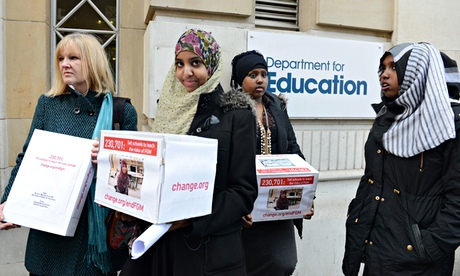
The Muslim Council of Britain, the country's largest Muslim organisation, has condemned the practice of female genital mutilation as "un-Islamic" and told its members that FGM risks bringing their religion into disrepute.
The influential MCB has for the first time issued explicit guidance, which criticises the practice and says it is "no longer linked to the teaching of Islam". It added that one of the "basic principles" of Islam was that believers should not harm themselves or others.
The organisation will send flyers to each of the 500 mosques that form its membership, which will also be distributed in community centres in a drive to eradicate a practice that affects 125 million women and girls worldwide and can lead to psychological torment, complications during childbirth, problems with fertility, and death.
The MCB has collaborated with the African women's support and campaigning organisation Forward and the Muslim Spiritual Care Provision in the NHS (MSCP) to raise awareness of the dangers of FGM and warn practitioners that they face up to 14 years in prison if they subject girls to the practice, which involves the removal of the clitoris, or in more extreme cases the removal of the outer labia and the sewing up of the vagina, with a small hole left for menstruation and to pass urine.
The leaflet states: "FGM is not an Islamic requirement. There is no reference to it in the holy Qur'an that states girls must be circumcised. Nor is there any authentic reference to this in the Sunnah, the sayings or traditions of our prophet. FGM is bringing the religion of Islam into disrepute."
It also states that there is "an increasingly high risk of being prosecuted" for carrying out mutilation, which has been illegal in Britain since 1985.
Dr Shuja Shafi, secretary-general of the Muslim Council of Britain, said: "We at the MCB are pleased to address this very important issue of female genital mutilation. Working closely together we can end this practice and ensure it is no longer linked to the religion of Islam or the teachings of the prophet Muhammad."
Dr Soheir Elneil, chair of the African women's campaign group Forward, which helped to prepare the leaflet, said the publication was a step forward in the battle to bring FGM to an end within a generation. "This is the first time such a publication has been achieved with the full cooperation and support of the relevant parties, and we hope all those working in FGM will find it a helpful tool in the work that they do," she said. "It states that FGM is non-Islamic and is against the teachings of Islam, that it is putting the health of women and girls at risk, and informs the reader of the legal implications in the UK of carrying out the practice."
Last week the Home Office held a summit at which other religious organisations, including the Shia al-Khoei Foundation and the Muslim Women's Network UK, announced their support for a government declaration against FGM to be published next month.

